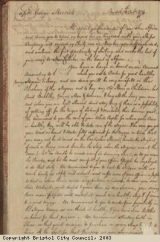Orders and agreements
Many different types of records in existence today can tell us about life on board slaving ships. Ships papers, account books and log-books, for example, are now in archives such as the Public Record Office in Kew. Papers from slave ships include written orders given to the ship’s captains and contracts of work signed by the crew. These contracts are called the ‘Articles of Agreement’.
The Articles of Agreement, or contract, shown below is for the crew on board the slave ship the Fame. The Fame was owned by James Rogers & Company. The ship sailed from Bristol on 7 November 1790 to Africa and the Caribbean, it returned to Bristol in October 1791. The round voyage lasted 11 months. The Agreement includes details of the food to be served to the crew and the arrangements that should be made if they had to be put on ‘short allowances’. This meant that if the voyage took longer than planned and the food started to run out, each crew-member would have their food rationed. This extract below is from Agreement:
‘Articles of Agreement between the Master, Officers, Mariners, Seamen and Seafaring men of the Ship Fame bound from the Port of Bristol upon an intended Voyage to the Coast of Africa, for Slaves from thence to the West Indies or America, and afterwards to Bristol …
‘Sunday – One Pound and Half of Beef, and Half a Pint of Flour
Monday – One Pound of Pork and Half a Pint of Pease.
Tuesday – One Pint of Oatmeal, and Two Ounces of butter and Four Ounces of Cheese; or One Pound of Stock Fish, with One-eighth of a Pint of Oil, and a Quarter of a Pint of Veinegar, in lieu of Butter and Cheese
Wednesday, The same as Monday,
Thursday, The same as Sunday
Friday, The same as Tuesday,
Saturday, The same as Monday.
Each Person besides to have Six Pounds of Bread per Week, and a Quarter of a Pint of spirits or half a Pint of Wine, per Day, during the Voyage. In lieu of Pease and Oatmeal shall be served Rice, Indian Corn, Yams or Calavances. In case of being put to Short Allowance, the Master, Officers and Seamen are to be at the same Allowance of Provisions or Water, and to be allowed Short Allowance Money, at the Rate of Three Pence per Day if at Two-thirds Allowance and Four Pence Halfpenny per Day per man, if at half Allowance, and to be paid their Short Allowance Money Ten Days before the Vessel sails from the West Indies or America …’
This extract from the ‘Articles of Agreement’ or contract between the ship’s captain and the crew shows details of life on board slaving ships. It shows the kind of food they were given to eat and the amounts they were allowed.
The next extracts are from the orders given to the captain of the ship the Africa before she sailed. He was told to look after his crew, which meant that the sailors were fit and well to look after the enslaved Africans. The slaves would need to be well looked after, as they would then sell for more money when the ship reached the Caribbean. The Africa made two slaving voyages. The orders were very similar for both voyages.
Orders given to George Merrick, captain of the ship the Africa, for its her first slaving voyage in 1774:
We recommend to you the care of your White People for when your Crew is healthy they will be able to take care of the Negroes’
Orders given to Thomas Baker, captain of the ship the Africa, for its her second slaving voyage in 1776:
‘Be careful of your white people’s health, for when they are healthy, they are able to take care of your Negroes, without which there is little probability of making a good voyage’
These written orders to the captains of slave ships tell us how important it was that the crew were properly looked after. In both instances, the captain was ordered to keep the crew in good health, so that they could look after the enslaved Africans on board the ship. By doing so, the crew were making sure that the slaves were in better shape to sell on arrival in the Caribbean. Pictured here is an extract from the account book of the ship the Africa, for its voyages in 1774 and 1776.



